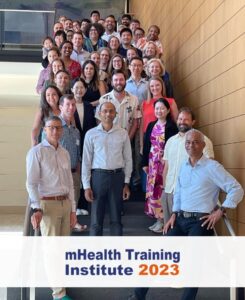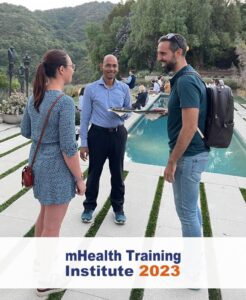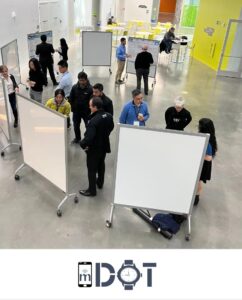Research Areas
Sensor-Based mHealth Markers | Sensor-Triggered Temporally-Precise mHealth Interventions
mHealth Privacy | mHealth Sensor Platforms
Sensor-Based mHealth Markers: The promise of mHealth is to provide unprecedented visibility into the physical, physiological, psychological, social, and environment state of an individual so as to discover the causes of various diseases which can be used in the development of treatments, interventions, and prevention programs. With support from NSF, we have used the real-life sensor data collected from AutoSense to develop computationally models for sensor-based continuous detection of risk for smoking lapse [4], speaking [3], stress [2], and smoking [1] from wearables. These works have established the wide utility of physiological monitoring in the field for automated detection of human behaviors and enabled sensor-triggered temporally-precise interventions.
- Ullah MA, Chatterjee S, Fagundes CP, Lam C, Nahum-Shani I, Rehg JM, Wetter DW, Kumar S. mRisk: Continuous Risk Estimation for Smoking Lapse from Noisy Sensor Data with Incomplete and Positive-Only Labels. Proc ACM Interact Mob Wearable Ubiquitous Technol. 2022 Sep;6(3) PubMed Central PMCID: PMC9979627.
- Bari R, Adams RJ, Rahman M, Parsons MB, Buder EH, Kumar S. rConverse: Moment by Moment Conversation Detection Using a Mobile Respiration Sensor. Proc ACM Interact Mob Wearable Ubiquitous Technol. 2018 Mar;2(1) PubMed Central PMCID: PMC6223316.
- Saleheen N, Ali AA, Hossain SM, Sarker H, Chatterjee S, Marlin B, Ertin E, al’Absi M, Kumar S. puffMarker: A Multi-Sensor Approach for Pinpointing the Timing of First Lapse in Smoking Cessation. Proc ACM Int Conf Ubiquitous Comput. 2015 Sep;2015:999-1010. PubMed Central PMCID: PMC4631252.
- Hovsepian K, al’Absi M, Ertin E, Kamarck T, Nakajima M, Kumar S. cStress: Towards a Gold Standard for Continuous Stress Assessment in the Mobile Environment. Proc ACM Int Conf Ubiquitous Comput. 2015 Sep;2015:493-504. PubMed Central PMCID: PMC4631393.
Sensor-Triggered Temporally-Precise mHealth Interventions: The sensing and inferencing of human states becomes practically useful when used in the design, development, and delivery of an intervention to improve health. As a first step towards development of sensor-triggered just-in-time interventions, we have developed methods to determine (from sensor data) when a user may be physically, cognitively, and socially available to be engaged in an intervention [2]. We find that users are least available at work and during driving, and most available when walking outside. Subsequently, we have identified from continuous measurement of stress in the natural environment that users are most stressed during driving. We have also developed visualizations of continuous stress data [1]. Our spatio-temporal visualizations help identify and explain between- and withinperson variability in stress patterns and contextual visualizations enable decisions regarding the timing, content, and modality of intervention. We developed a time series pattern mining method to detect significant stress episodes in a time series of discontinuous and rapidly varying stress data for delivering post-stress intervention [3]. Using 4 weeks of physiological, GPS, and activity data collected from 38 users in their natural environment, we developed a model to predict stressful episodes in advance for proactive stress intervention. We also developed a model to assess from GPS traces whether the current surrounding represents a vulnerable smoking situation, including the detection of high-risk microlocations, e.g., personal smoking spots [4].
- Chatterjee S, Moreno A, Lizotte SL, Akther S, Ertin E, Fagundes CP, Lam C, Rehg JM, Wan N, Wetter DW, Kumar S. SmokingOpp: Detecting the Smoking ‘Opportunity’ Context Using Mobile Sensors. Proc ACM Interact Mob Wearable Ubiquitous Technol. 2020 Mar;4(1) PubMed Central PMCID: PMC8513752.
- Sarker H, Tyburski M, Rahman MM, Hovsepian K, Sharmin M, Epstein DH, Preston KL, Furr-Holden CD, Milam A, Nahum-Shani I, al’Absi M, Kumar S. Finding Significant Stress Episodes in a Discontinuous Time Series of Rapidly Varying Mobile Sensor Data. Proc SIGCHI Conf Hum Factor Comput Syst. 2016 May;2016:4489-4501. PubMed Central PMCID: PMC5207658.
- Sharmin M, Raij A, Epstien D, Nahum-Shani I, Beck JG, Vhaduri S, Preston K, Kumar S. Visualization of Time-Series Sensor Data to Inform the Design of Just-In-Time Adaptive Stress Interventions. Proc ACM Int Conf Ubiquitous Comput. 2015 Sep;2015:505-516. PubMed Central PMCID: PMC4629803.
- Sarker H, Sharmin M, Ali AA, Rahman MM, Bari R, Hossain SM, Kumar S. Assessing the Availability of Users to Engage in Just-in-Time Intervention in the Natural Environment. Proc ACM Int Conf Ubiquitous Comput. 2014;2014:909-920. PubMed Central PMCID: PMC4365928.
mHealth Privacy: mHealth systems have deep privacy implications. Our work on mHealth inferencing in the FieldStream project revealed that sensors once considered innocuous, such as respiration, can reveal potentially private behaviors and psychological states such as stress, conversation, smoking, or drug use events. This raises new privacy issues for sharing of mHealth data [4], since the focus of privacy research has traditionally been on protecting the identity of individuals in a group, and not on protecting the revelation of private behaviors. We highlighted several new research challenges in mHealth privacy [1]. To address behavioral privacy, we proposed a selective replacements corresponding to any behaviorally-private event with plausible sensor trace from the same user [2]. We recently showed that wrist-worn accelerometry has high potential to re-identify the wearer, especially when performing daily physical activities (e.g., walk) [3].
- Saleheen N, Ullah MA, Chakraborty S, Ones DS, Srivastava M, Kumar S. WristPrint: Characterizing User Re-identification Risks from Wrist-worn Accelerometry Data. Conf Comput Commun Secur. 2021 Nov;2021:2807-2823. PubMed Central PMCID: PMC9988376.
- Saleheen N, Chakraborty S, Ali N, Mahbubur Rahman M, Hossain SM, Bari R, Buder E, Srivastava M, Kumar S. mSieve: Differential Behavioral Privacy in Time Series of Mobile Sensor Data. Proc ACM Int Conf Ubiquitous Comput. 2016 Sep;2016:706-717. PubMed Central PMCID: PMC5207660.
- Kotz D, Gunter CA, Kumar S, Weiner JP. Privacy and Security in Mobile Health: A Research Agenda. Computer (Long Beach Calif). 2016 Jun;49(6):22-30. PubMed Central PMCID: PMC5362254.
- Raij A, Ghosh A, Kumar S, Srivastava M. Privacy risks emerging from the adoption of innocuous wearable sensors in the mobile environment. Proceedings of the SIGCHI Conference on Human Factors in Computing Systems. 2011 May 07; :11. Available from: https://dl.acm.org/doi/10.1145/1978942.1978945 DOI: 10.1145/1978942.1978945; NIHMSID: NIHMS1984197
mHealth Sensor Platforms: With support from NIH’s Genes Environment & Health Initiative (GEI), my team developed the AutoSense sensor suite [4] that hosts ten sensors (ECG, respiration, skin conductance, accelerometry, temperature, alcohol, etc.), is ultra-low-power, is optimized for on-body sensing in the mobile environment, and convenient for long-term wearing. AutoSense is complemented by a robust software framework on the mobile phone that collects continuous measurements from wearable wireless sensors, processes them to make health inferences, and solicits self-reports on the phone, all in real-time. This system has been worn by 2,500+ human volunteers (including daily smokers, drinkers, and drug users) for 200,000+ hours in their natural environments as part of various field studies, producing 300 terabytes of sensor data for research [2,3]. These sensor devices are complemented by a novel app ecosystem consisting of tens of interconnected apps for smartphones that are used to collect sensor data from wearable devices and time-synchronized self-reports from participants [1].
- Hossain SM, Hnat T, Saleheen N, Nasrin NJ, Noor J, Ho BJ, Condie T, Srivastava M, Kumar S. mCerebrum: A Mobile Sensing Software Platform for Development and Validation of Digital Biomarkers and Interventions. Proc Int Conf Embed Netw Sens Syst. 2017 Nov;2017 PubMed Central PMCID: PMC6168216.
- Kennedy AP, Epstein DH, Jobes ML, Agage D, Tyburski M, Phillips KA, Ali AA, Bari R, Hossain SM, Hovsepian K, Rahman MM, Ertin E, Kumar S, Preston KL. Continuous in-the-field measurement of heart rate: Correlates of drug use, craving, stress, and mood in polydrug users. Drug Alcohol Depend. 2015 Jun 1;151:159-66. PubMed Central PMCID: PMC4447529.
- Rahman M, Bari R, Ali AA, Sharmin M, Raij A, Hovsepian K, Hossain SM, Ertin E, Kennedy A, Epstein DH, Preston KL, Jobes M, Beck JG, Kedia S, Ward KD, al’Absi M, Kumar S. Are We There Yet? Feasibility of Continuous Stress Assessment via Wireless Physiological Sensors. ACM BCB. 2014;2014:479-488. PubMed Central PMCID: PMC4374173.
- Ertin E, Stohs N, Kumar S, Raij A, al”Absi M, Shah S. AutoSense: unobtrusively wearable sensor suite for inferring the onset, causality, and consequences of stress in the field. SenSys ’11: Proceedings of the 9th ACM Conference on Embedded Networked Sensor Systems. 2011 November; :274. Available from: https://dl.acm.org/doi/10.1145/2070942.2070970 DOI: 10.1145/2070942.2070970; NIHMSID: NIHMS1984196










